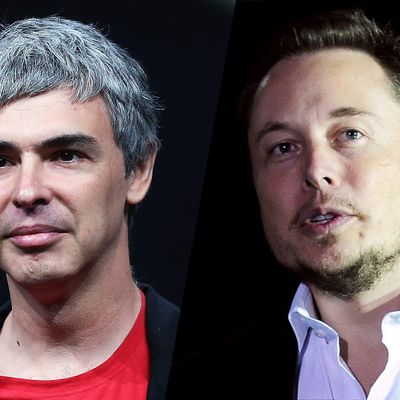
Earlier this week, billionaire Google CEO Larry Page made a strange admission about how he defines philanthropy. In front of a TED audience, while being interviewed by Charlie Rose, Page confirmed what he’d said before – that upon his death, rather than giving his fortune to a nonprofit organization or bequeathing it to his heirs, he would prefer to give it to Elon Musk, the founder of SpaceX and Tesla Motors. Musk, Page believes, is the kind of visionary whose ideas will do untold amounts of good for the world, and who could make better use of a gigantic money infusion than a standard charity.
“That’s a company, and that’s philanthropical,” Page said, according to Wired. He also apparently urged audience members to give their money to corporations rather than nonprofits.
This idea – that corporations make better vehicles for humanitarian change than nonprofit organizations – didn’t come out of nowhere. It’s related to philanthrocapitalism, the concept that has taken over the charitable giving world in the last decade, and which counts among its fans billionaires like Bill Gates, Pierre Omidyar, and Michael Bloomberg.
The difference between philanthrocapitalism and Page’s idea of corporate charity is easy to miss, but it’s important. Philanthrocapitalists believe that charities should be run more like businesses – with performance benchmarks, metrics-based analysis, and accountability to stakeholders. They think, broadly, that charities should apply the methods of big business to their own operations, and that for-profit ventures can supplement the role of the nonprofit sector in solving humanity’s biggest problems.
That’s a widely accepted view, and there’s nothing particularly controversial about it in 2014. Page, though, is going further. He’s saying that companies like SpaceX and Tesla are themselves philanthropic organizations, and that supporting those companies financially is preferable to supporting charitable causes in the traditional way. Given that Page doesn’t have much of a public track record of conventional charitable giving, we can assume he’s not just speaking theoretically.
There are a few problems with Page’s vision of charitable corporatism. One is a simple definitional issue – corporations aren’t required to produce gains for anybody other than their shareholders, whereas 501(c)(3) organizations can’t be operated for the benefit of private interests. Elon Musk may want to improve humanity’s lot with his space exploration, but SpaceX is a for-profit, Delaware-chartered corporation, and as such, the goal of making the world a better place will always be secondary to the business motive. It has to be – it’s right there in the corporate charter.
The bigger problem, though, is that Page’s brand of charity, when put into practice, can distance philanthropic capital from its intended recipients.
Imagine a billionaire whose pet issue is the plight of orphans. Instead of giving money directly to orphans, or cutting checks to charities that run orphanages, the billionaire decides to fund “Orphn,” a (made-up) for-profit start-up that connects orphans to adoption-ready parents and takes a small fee from each successful pairing.
Orphn might be wildly successful, giving homes to millions of orphans and producing billions of dollars in profits for the company itself. But why stop there? For maximum impact, the billionaire realizes that he could produce better returns by creating an entire generation of start-up humanitarians. So he gives his money to Harvard Business School, earmarked for a fellowship in entrepreneurial orphan assistance. Pretty soon, the money that was once going to orphans is now going to an Ivy League university, with no assurance that it will ever trickle down to actual orphans.
This kind of rationalization happens all the time with donors from the business world, and it’s easy to see why. Rich businesspeople like structure. They trust professionally managed institutions more than individuals. (Especially poor individuals.) They hate inefficiencies, and they love scalability. To them, cutting a check to an African farmer using GiveDirectly feels like throwing their money into the void. They’d rather set up a foundation to help African farmers through microloans, staff it with American MBAs, and go to sleep at night knowing that their donation will produce value for decades to come.
Smart charities have learned to flatter the entrepreneurial philanthropist by appealing to these instincts. (See how the Silicon Valley Community Foundation, the organization that just got a $1 billion donation from Mark Zuckerberg, advises its staff to “Remember that most entrepreneurs undertake philanthropy to help fix problems with the money, expertise, and ‘uniquely optimistic’ passion that worked in building their businesses.”) But that kind of strategy won’t work on people like Page, for whom the appeal of nonprofits run like corporations is inferior to the appeal of corporations themselves.
There are many models of charitable giving, and many of them are worthy and useful. To an extent, we’re talking about shades of good here. But if Page’s model catches on, it could result in a lot of CEOs getting their philanthropic warm-fuzzies by contributing to Apple, Google, Facebook, or any number of other for-profit entities. That money could go to waste if those companies spend it developing unsuccessful products or paying outrageous salaries to executives. And it could mean that a lot of nonprofit organizations find their donor pool evaporating.
Buying stock in Microsoft is simply not the same as giving money to the Bill & Melinda Gates Foundation. They have different mandates, different goals, and different beneficiaries. Elon Musk might be a genius – he may even end up colonizing Mars, and improving the lives of billions. But we shouldn’t confuse his company for a cause, and we shouldn’t let Larry Page’s hero-worship – as well-meaning as it is – elide the difference between corporations and charities. They’re very different things, no matter how much one masquerades as the other.





























